Challenges and Recommendations for the Air Cargo Industry in the UK
VerifiedAdded on 2022/11/13
|12
|3119
|230
AI Summary
This article discusses the challenges faced by the air cargo industry in the UK and provides recommendations to mitigate them. The challenges include security, stiff competition, airport quality, environment issues, and e-commerce glut. The article suggests that the UK should develop a stronger air cargo industry, sensitize consumers on security measures, ensure uniformity in technology compliance, comply with environmental rules, and work closely with e-commerce companies.
Contribute Materials
Your contribution can guide someone’s learning journey. Share your
documents today.
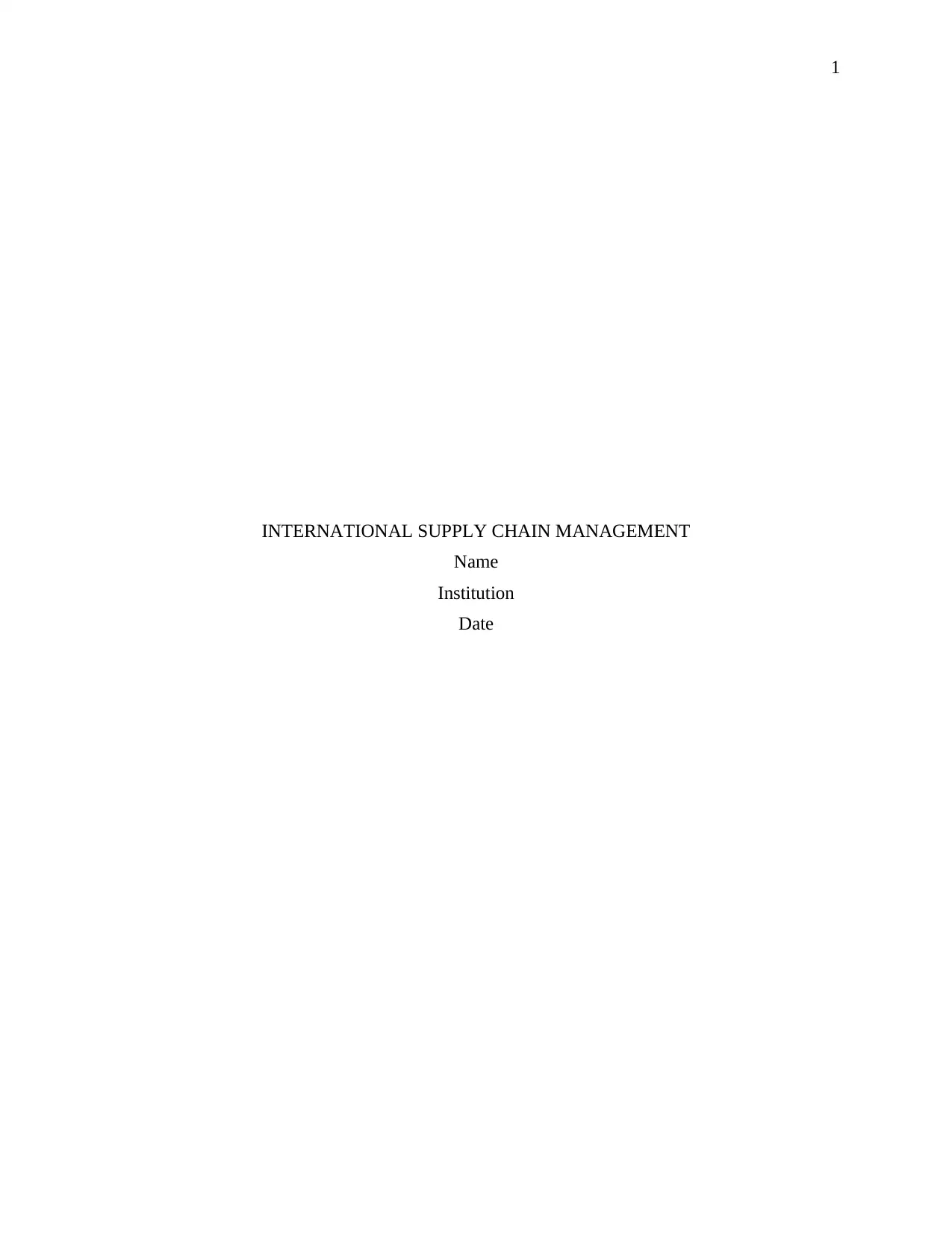
1
INTERNATIONAL SUPPLY CHAIN MANAGEMENT
Name
Institution
Date
INTERNATIONAL SUPPLY CHAIN MANAGEMENT
Name
Institution
Date
Secure Best Marks with AI Grader
Need help grading? Try our AI Grader for instant feedback on your assignments.
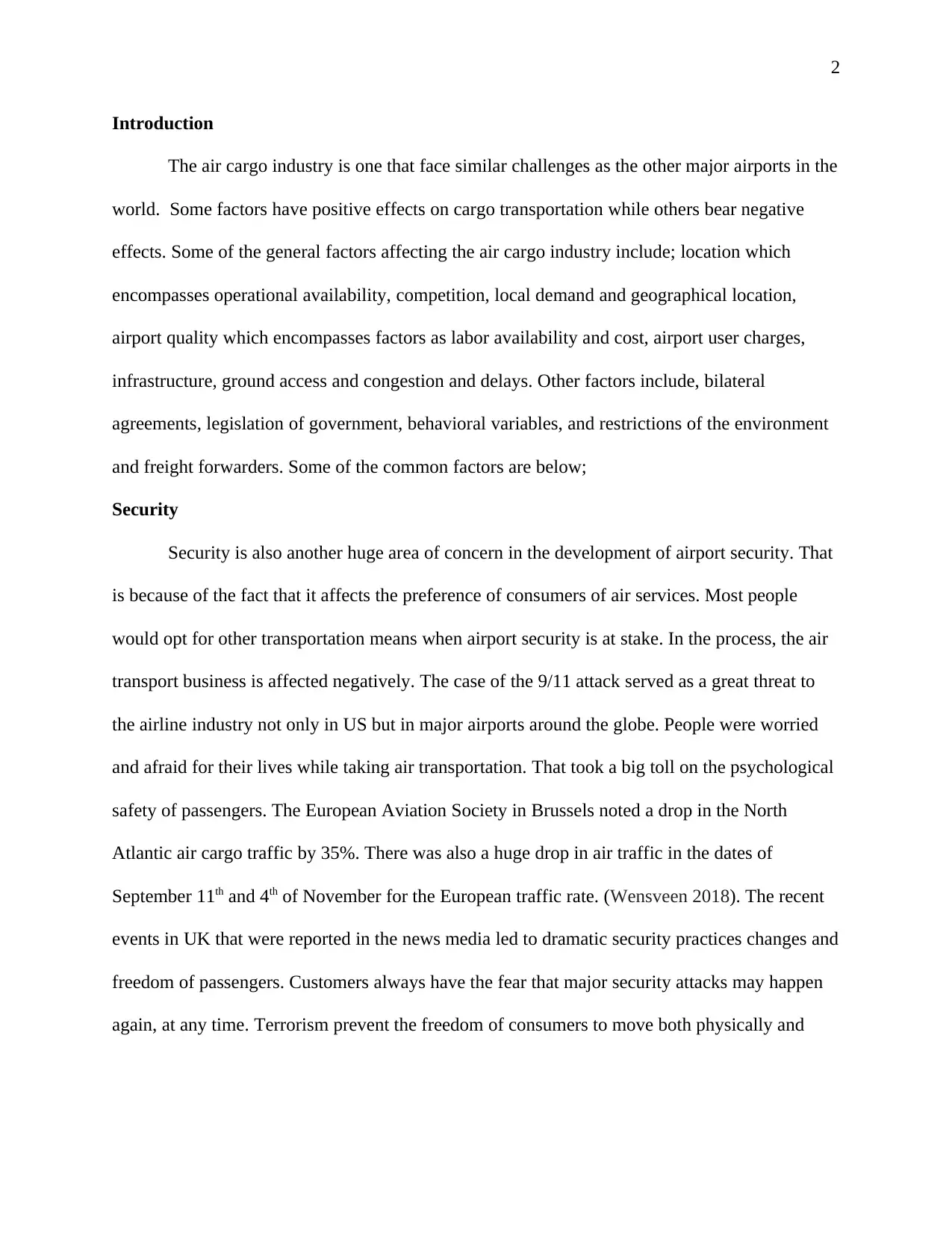
2
Introduction
The air cargo industry is one that face similar challenges as the other major airports in the
world. Some factors have positive effects on cargo transportation while others bear negative
effects. Some of the general factors affecting the air cargo industry include; location which
encompasses operational availability, competition, local demand and geographical location,
airport quality which encompasses factors as labor availability and cost, airport user charges,
infrastructure, ground access and congestion and delays. Other factors include, bilateral
agreements, legislation of government, behavioral variables, and restrictions of the environment
and freight forwarders. Some of the common factors are below;
Security
Security is also another huge area of concern in the development of airport security. That
is because of the fact that it affects the preference of consumers of air services. Most people
would opt for other transportation means when airport security is at stake. In the process, the air
transport business is affected negatively. The case of the 9/11 attack served as a great threat to
the airline industry not only in US but in major airports around the globe. People were worried
and afraid for their lives while taking air transportation. That took a big toll on the psychological
safety of passengers. The European Aviation Society in Brussels noted a drop in the North
Atlantic air cargo traffic by 35%. There was also a huge drop in air traffic in the dates of
September 11th and 4th of November for the European traffic rate. (Wensveen 2018). The recent
events in UK that were reported in the news media led to dramatic security practices changes and
freedom of passengers. Customers always have the fear that major security attacks may happen
again, at any time. Terrorism prevent the freedom of consumers to move both physically and
Introduction
The air cargo industry is one that face similar challenges as the other major airports in the
world. Some factors have positive effects on cargo transportation while others bear negative
effects. Some of the general factors affecting the air cargo industry include; location which
encompasses operational availability, competition, local demand and geographical location,
airport quality which encompasses factors as labor availability and cost, airport user charges,
infrastructure, ground access and congestion and delays. Other factors include, bilateral
agreements, legislation of government, behavioral variables, and restrictions of the environment
and freight forwarders. Some of the common factors are below;
Security
Security is also another huge area of concern in the development of airport security. That
is because of the fact that it affects the preference of consumers of air services. Most people
would opt for other transportation means when airport security is at stake. In the process, the air
transport business is affected negatively. The case of the 9/11 attack served as a great threat to
the airline industry not only in US but in major airports around the globe. People were worried
and afraid for their lives while taking air transportation. That took a big toll on the psychological
safety of passengers. The European Aviation Society in Brussels noted a drop in the North
Atlantic air cargo traffic by 35%. There was also a huge drop in air traffic in the dates of
September 11th and 4th of November for the European traffic rate. (Wensveen 2018). The recent
events in UK that were reported in the news media led to dramatic security practices changes and
freedom of passengers. Customers always have the fear that major security attacks may happen
again, at any time. Terrorism prevent the freedom of consumers to move both physically and
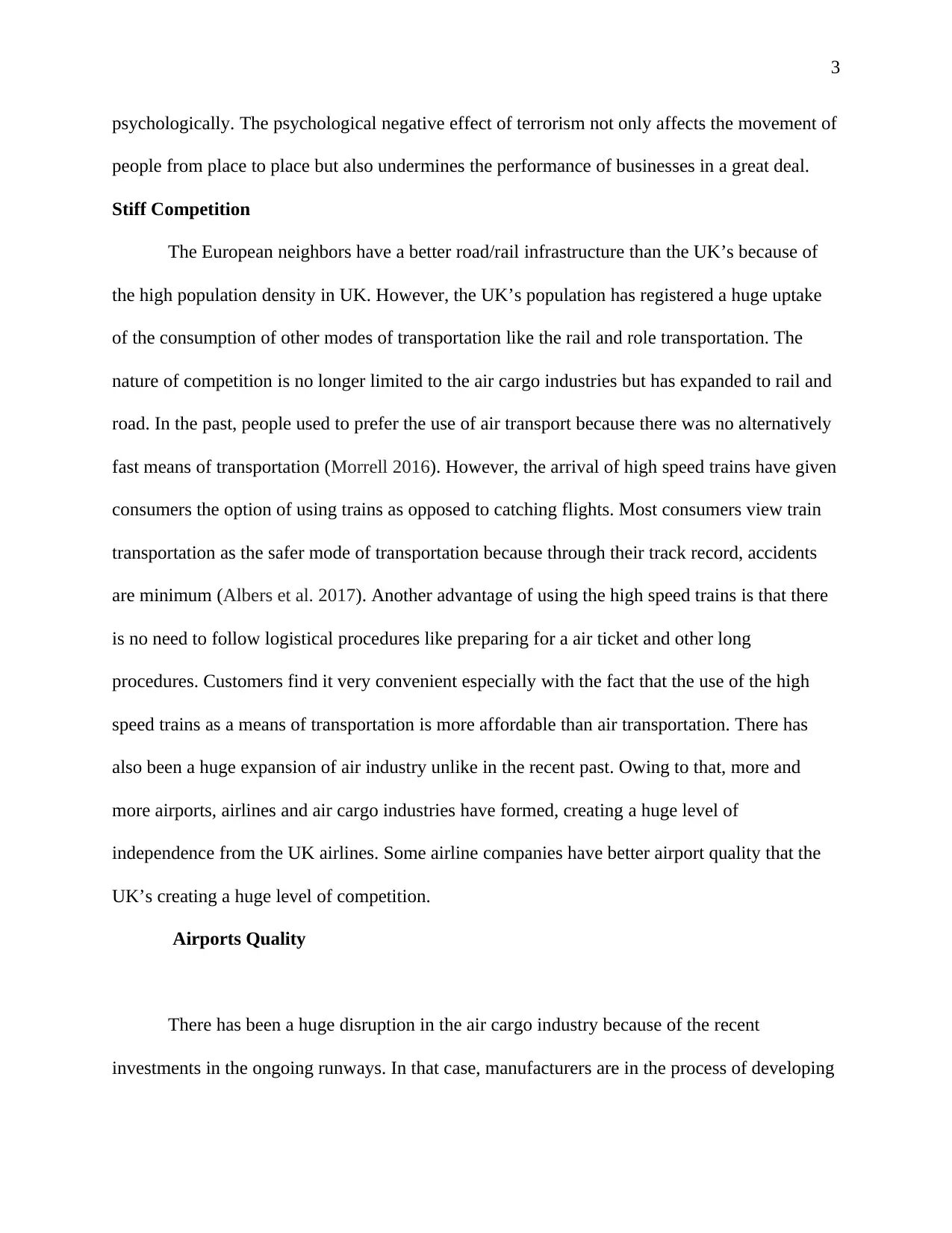
3
psychologically. The psychological negative effect of terrorism not only affects the movement of
people from place to place but also undermines the performance of businesses in a great deal.
Stiff Competition
The European neighbors have a better road/rail infrastructure than the UK’s because of
the high population density in UK. However, the UK’s population has registered a huge uptake
of the consumption of other modes of transportation like the rail and role transportation. The
nature of competition is no longer limited to the air cargo industries but has expanded to rail and
road. In the past, people used to prefer the use of air transport because there was no alternatively
fast means of transportation (Morrell 2016). However, the arrival of high speed trains have given
consumers the option of using trains as opposed to catching flights. Most consumers view train
transportation as the safer mode of transportation because through their track record, accidents
are minimum (Albers et al. 2017). Another advantage of using the high speed trains is that there
is no need to follow logistical procedures like preparing for a air ticket and other long
procedures. Customers find it very convenient especially with the fact that the use of the high
speed trains as a means of transportation is more affordable than air transportation. There has
also been a huge expansion of air industry unlike in the recent past. Owing to that, more and
more airports, airlines and air cargo industries have formed, creating a huge level of
independence from the UK airlines. Some airline companies have better airport quality that the
UK’s creating a huge level of competition.
Airports Quality
There has been a huge disruption in the air cargo industry because of the recent
investments in the ongoing runways. In that case, manufacturers are in the process of developing
psychologically. The psychological negative effect of terrorism not only affects the movement of
people from place to place but also undermines the performance of businesses in a great deal.
Stiff Competition
The European neighbors have a better road/rail infrastructure than the UK’s because of
the high population density in UK. However, the UK’s population has registered a huge uptake
of the consumption of other modes of transportation like the rail and role transportation. The
nature of competition is no longer limited to the air cargo industries but has expanded to rail and
road. In the past, people used to prefer the use of air transport because there was no alternatively
fast means of transportation (Morrell 2016). However, the arrival of high speed trains have given
consumers the option of using trains as opposed to catching flights. Most consumers view train
transportation as the safer mode of transportation because through their track record, accidents
are minimum (Albers et al. 2017). Another advantage of using the high speed trains is that there
is no need to follow logistical procedures like preparing for a air ticket and other long
procedures. Customers find it very convenient especially with the fact that the use of the high
speed trains as a means of transportation is more affordable than air transportation. There has
also been a huge expansion of air industry unlike in the recent past. Owing to that, more and
more airports, airlines and air cargo industries have formed, creating a huge level of
independence from the UK airlines. Some airline companies have better airport quality that the
UK’s creating a huge level of competition.
Airports Quality
There has been a huge disruption in the air cargo industry because of the recent
investments in the ongoing runways. In that case, manufacturers are in the process of developing
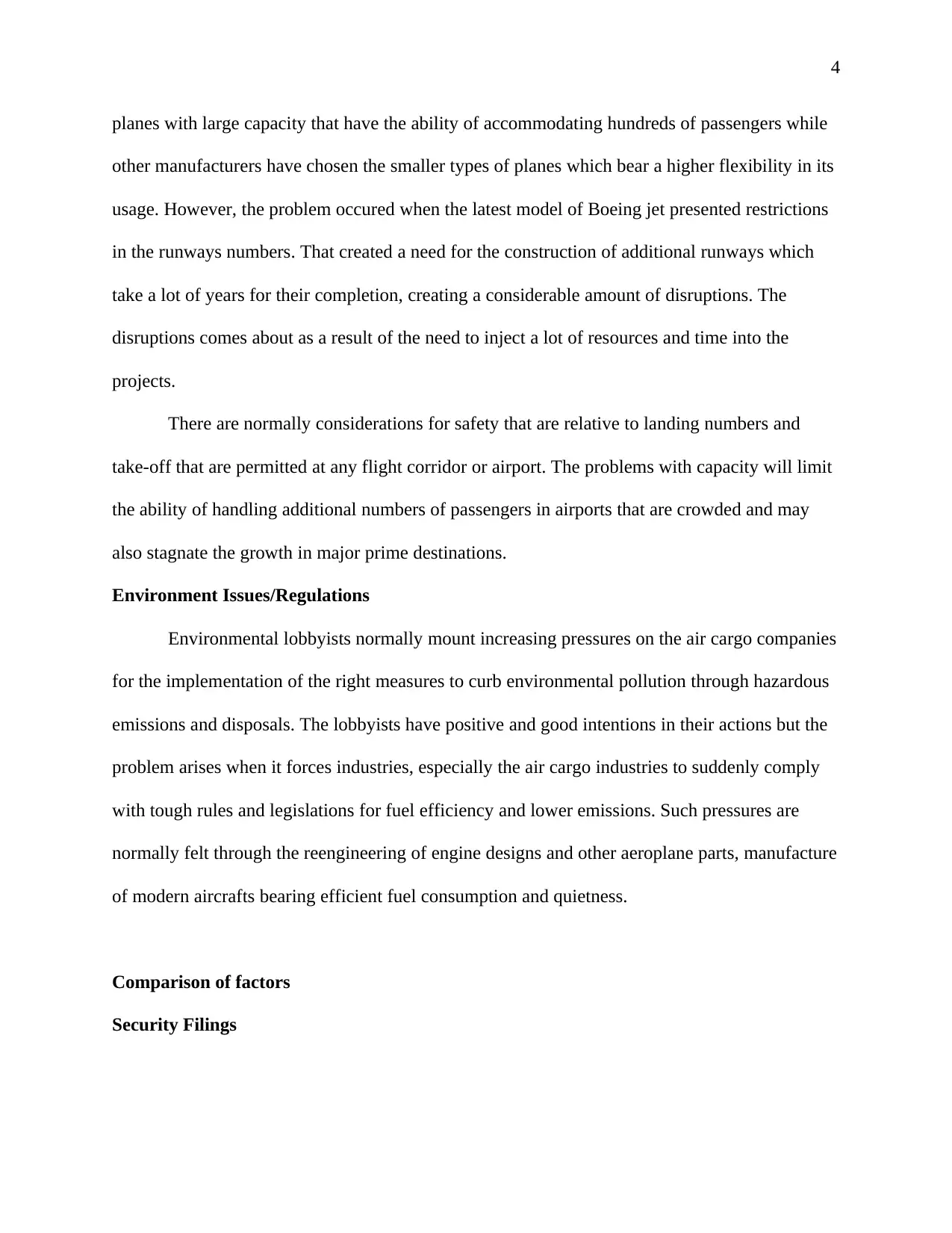
4
planes with large capacity that have the ability of accommodating hundreds of passengers while
other manufacturers have chosen the smaller types of planes which bear a higher flexibility in its
usage. However, the problem occured when the latest model of Boeing jet presented restrictions
in the runways numbers. That created a need for the construction of additional runways which
take a lot of years for their completion, creating a considerable amount of disruptions. The
disruptions comes about as a result of the need to inject a lot of resources and time into the
projects.
There are normally considerations for safety that are relative to landing numbers and
take-off that are permitted at any flight corridor or airport. The problems with capacity will limit
the ability of handling additional numbers of passengers in airports that are crowded and may
also stagnate the growth in major prime destinations.
Environment Issues/Regulations
Environmental lobbyists normally mount increasing pressures on the air cargo companies
for the implementation of the right measures to curb environmental pollution through hazardous
emissions and disposals. The lobbyists have positive and good intentions in their actions but the
problem arises when it forces industries, especially the air cargo industries to suddenly comply
with tough rules and legislations for fuel efficiency and lower emissions. Such pressures are
normally felt through the reengineering of engine designs and other aeroplane parts, manufacture
of modern aircrafts bearing efficient fuel consumption and quietness.
Comparison of factors
Security Filings
planes with large capacity that have the ability of accommodating hundreds of passengers while
other manufacturers have chosen the smaller types of planes which bear a higher flexibility in its
usage. However, the problem occured when the latest model of Boeing jet presented restrictions
in the runways numbers. That created a need for the construction of additional runways which
take a lot of years for their completion, creating a considerable amount of disruptions. The
disruptions comes about as a result of the need to inject a lot of resources and time into the
projects.
There are normally considerations for safety that are relative to landing numbers and
take-off that are permitted at any flight corridor or airport. The problems with capacity will limit
the ability of handling additional numbers of passengers in airports that are crowded and may
also stagnate the growth in major prime destinations.
Environment Issues/Regulations
Environmental lobbyists normally mount increasing pressures on the air cargo companies
for the implementation of the right measures to curb environmental pollution through hazardous
emissions and disposals. The lobbyists have positive and good intentions in their actions but the
problem arises when it forces industries, especially the air cargo industries to suddenly comply
with tough rules and legislations for fuel efficiency and lower emissions. Such pressures are
normally felt through the reengineering of engine designs and other aeroplane parts, manufacture
of modern aircrafts bearing efficient fuel consumption and quietness.
Comparison of factors
Security Filings
Secure Best Marks with AI Grader
Need help grading? Try our AI Grader for instant feedback on your assignments.
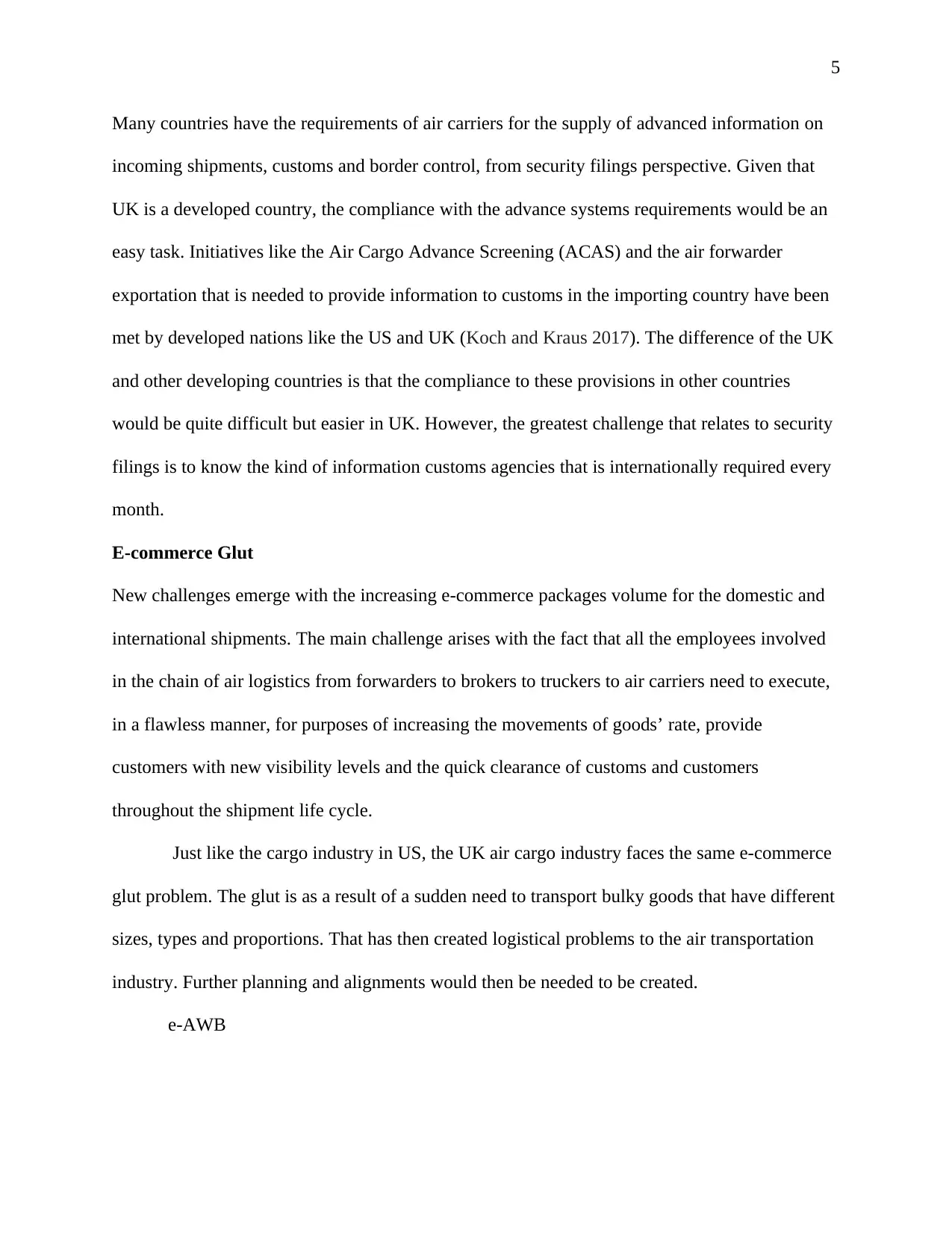
5
Many countries have the requirements of air carriers for the supply of advanced information on
incoming shipments, customs and border control, from security filings perspective. Given that
UK is a developed country, the compliance with the advance systems requirements would be an
easy task. Initiatives like the Air Cargo Advance Screening (ACAS) and the air forwarder
exportation that is needed to provide information to customs in the importing country have been
met by developed nations like the US and UK (Koch and Kraus 2017). The difference of the UK
and other developing countries is that the compliance to these provisions in other countries
would be quite difficult but easier in UK. However, the greatest challenge that relates to security
filings is to know the kind of information customs agencies that is internationally required every
month.
E-commerce Glut
New challenges emerge with the increasing e-commerce packages volume for the domestic and
international shipments. The main challenge arises with the fact that all the employees involved
in the chain of air logistics from forwarders to brokers to truckers to air carriers need to execute,
in a flawless manner, for purposes of increasing the movements of goods’ rate, provide
customers with new visibility levels and the quick clearance of customs and customers
throughout the shipment life cycle.
Just like the cargo industry in US, the UK air cargo industry faces the same e-commerce
glut problem. The glut is as a result of a sudden need to transport bulky goods that have different
sizes, types and proportions. That has then created logistical problems to the air transportation
industry. Further planning and alignments would then be needed to be created.
e-AWB
Many countries have the requirements of air carriers for the supply of advanced information on
incoming shipments, customs and border control, from security filings perspective. Given that
UK is a developed country, the compliance with the advance systems requirements would be an
easy task. Initiatives like the Air Cargo Advance Screening (ACAS) and the air forwarder
exportation that is needed to provide information to customs in the importing country have been
met by developed nations like the US and UK (Koch and Kraus 2017). The difference of the UK
and other developing countries is that the compliance to these provisions in other countries
would be quite difficult but easier in UK. However, the greatest challenge that relates to security
filings is to know the kind of information customs agencies that is internationally required every
month.
E-commerce Glut
New challenges emerge with the increasing e-commerce packages volume for the domestic and
international shipments. The main challenge arises with the fact that all the employees involved
in the chain of air logistics from forwarders to brokers to truckers to air carriers need to execute,
in a flawless manner, for purposes of increasing the movements of goods’ rate, provide
customers with new visibility levels and the quick clearance of customs and customers
throughout the shipment life cycle.
Just like the cargo industry in US, the UK air cargo industry faces the same e-commerce
glut problem. The glut is as a result of a sudden need to transport bulky goods that have different
sizes, types and proportions. That has then created logistical problems to the air transportation
industry. Further planning and alignments would then be needed to be created.
e-AWB
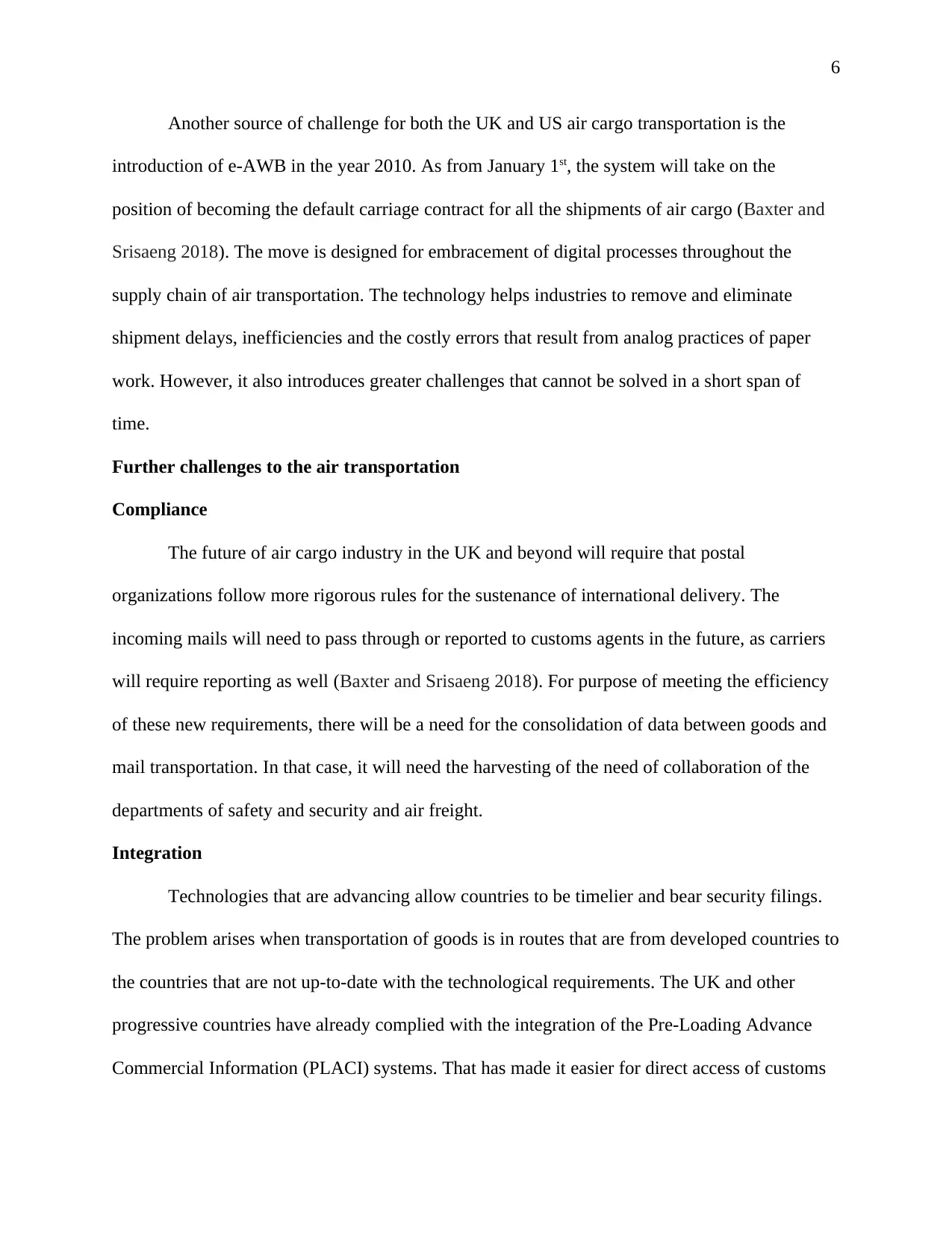
6
Another source of challenge for both the UK and US air cargo transportation is the
introduction of e-AWB in the year 2010. As from January 1st, the system will take on the
position of becoming the default carriage contract for all the shipments of air cargo (Baxter and
Srisaeng 2018). The move is designed for embracement of digital processes throughout the
supply chain of air transportation. The technology helps industries to remove and eliminate
shipment delays, inefficiencies and the costly errors that result from analog practices of paper
work. However, it also introduces greater challenges that cannot be solved in a short span of
time.
Further challenges to the air transportation
Compliance
The future of air cargo industry in the UK and beyond will require that postal
organizations follow more rigorous rules for the sustenance of international delivery. The
incoming mails will need to pass through or reported to customs agents in the future, as carriers
will require reporting as well (Baxter and Srisaeng 2018). For purpose of meeting the efficiency
of these new requirements, there will be a need for the consolidation of data between goods and
mail transportation. In that case, it will need the harvesting of the need of collaboration of the
departments of safety and security and air freight.
Integration
Technologies that are advancing allow countries to be timelier and bear security filings.
The problem arises when transportation of goods is in routes that are from developed countries to
the countries that are not up-to-date with the technological requirements. The UK and other
progressive countries have already complied with the integration of the Pre-Loading Advance
Commercial Information (PLACI) systems. That has made it easier for direct access of customs
Another source of challenge for both the UK and US air cargo transportation is the
introduction of e-AWB in the year 2010. As from January 1st, the system will take on the
position of becoming the default carriage contract for all the shipments of air cargo (Baxter and
Srisaeng 2018). The move is designed for embracement of digital processes throughout the
supply chain of air transportation. The technology helps industries to remove and eliminate
shipment delays, inefficiencies and the costly errors that result from analog practices of paper
work. However, it also introduces greater challenges that cannot be solved in a short span of
time.
Further challenges to the air transportation
Compliance
The future of air cargo industry in the UK and beyond will require that postal
organizations follow more rigorous rules for the sustenance of international delivery. The
incoming mails will need to pass through or reported to customs agents in the future, as carriers
will require reporting as well (Baxter and Srisaeng 2018). For purpose of meeting the efficiency
of these new requirements, there will be a need for the consolidation of data between goods and
mail transportation. In that case, it will need the harvesting of the need of collaboration of the
departments of safety and security and air freight.
Integration
Technologies that are advancing allow countries to be timelier and bear security filings.
The problem arises when transportation of goods is in routes that are from developed countries to
the countries that are not up-to-date with the technological requirements. The UK and other
progressive countries have already complied with the integration of the Pre-Loading Advance
Commercial Information (PLACI) systems. That has made it easier for direct access of customs
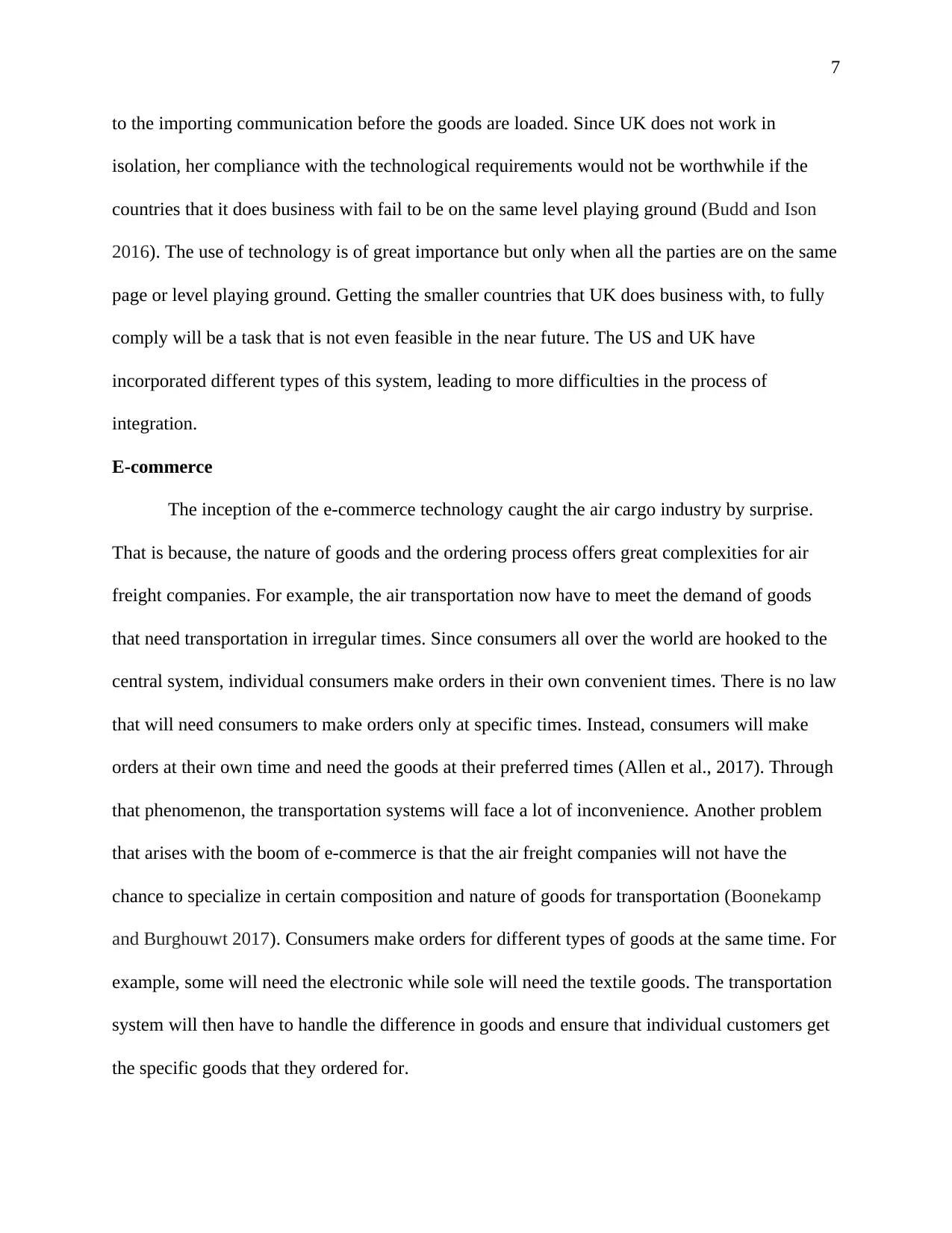
7
to the importing communication before the goods are loaded. Since UK does not work in
isolation, her compliance with the technological requirements would not be worthwhile if the
countries that it does business with fail to be on the same level playing ground (Budd and Ison
2016). The use of technology is of great importance but only when all the parties are on the same
page or level playing ground. Getting the smaller countries that UK does business with, to fully
comply will be a task that is not even feasible in the near future. The US and UK have
incorporated different types of this system, leading to more difficulties in the process of
integration.
E-commerce
The inception of the e-commerce technology caught the air cargo industry by surprise.
That is because, the nature of goods and the ordering process offers great complexities for air
freight companies. For example, the air transportation now have to meet the demand of goods
that need transportation in irregular times. Since consumers all over the world are hooked to the
central system, individual consumers make orders in their own convenient times. There is no law
that will need consumers to make orders only at specific times. Instead, consumers will make
orders at their own time and need the goods at their preferred times (Allen et al., 2017). Through
that phenomenon, the transportation systems will face a lot of inconvenience. Another problem
that arises with the boom of e-commerce is that the air freight companies will not have the
chance to specialize in certain composition and nature of goods for transportation (Boonekamp
and Burghouwt 2017). Consumers make orders for different types of goods at the same time. For
example, some will need the electronic while sole will need the textile goods. The transportation
system will then have to handle the difference in goods and ensure that individual customers get
the specific goods that they ordered for.
to the importing communication before the goods are loaded. Since UK does not work in
isolation, her compliance with the technological requirements would not be worthwhile if the
countries that it does business with fail to be on the same level playing ground (Budd and Ison
2016). The use of technology is of great importance but only when all the parties are on the same
page or level playing ground. Getting the smaller countries that UK does business with, to fully
comply will be a task that is not even feasible in the near future. The US and UK have
incorporated different types of this system, leading to more difficulties in the process of
integration.
E-commerce
The inception of the e-commerce technology caught the air cargo industry by surprise.
That is because, the nature of goods and the ordering process offers great complexities for air
freight companies. For example, the air transportation now have to meet the demand of goods
that need transportation in irregular times. Since consumers all over the world are hooked to the
central system, individual consumers make orders in their own convenient times. There is no law
that will need consumers to make orders only at specific times. Instead, consumers will make
orders at their own time and need the goods at their preferred times (Allen et al., 2017). Through
that phenomenon, the transportation systems will face a lot of inconvenience. Another problem
that arises with the boom of e-commerce is that the air freight companies will not have the
chance to specialize in certain composition and nature of goods for transportation (Boonekamp
and Burghouwt 2017). Consumers make orders for different types of goods at the same time. For
example, some will need the electronic while sole will need the textile goods. The transportation
system will then have to handle the difference in goods and ensure that individual customers get
the specific goods that they ordered for.
Paraphrase This Document
Need a fresh take? Get an instant paraphrase of this document with our AI Paraphraser
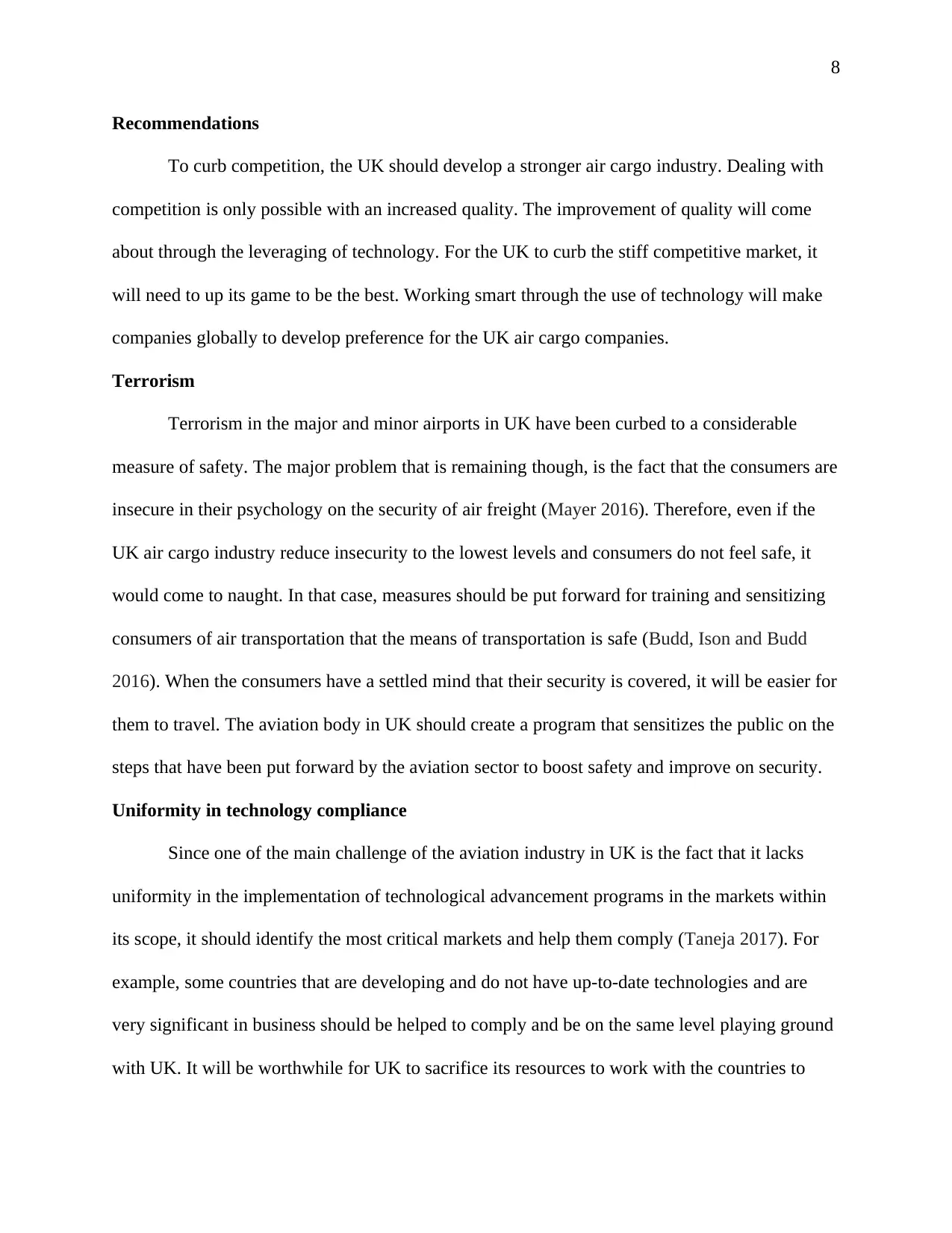
8
Recommendations
To curb competition, the UK should develop a stronger air cargo industry. Dealing with
competition is only possible with an increased quality. The improvement of quality will come
about through the leveraging of technology. For the UK to curb the stiff competitive market, it
will need to up its game to be the best. Working smart through the use of technology will make
companies globally to develop preference for the UK air cargo companies.
Terrorism
Terrorism in the major and minor airports in UK have been curbed to a considerable
measure of safety. The major problem that is remaining though, is the fact that the consumers are
insecure in their psychology on the security of air freight (Mayer 2016). Therefore, even if the
UK air cargo industry reduce insecurity to the lowest levels and consumers do not feel safe, it
would come to naught. In that case, measures should be put forward for training and sensitizing
consumers of air transportation that the means of transportation is safe (Budd, Ison and Budd
2016). When the consumers have a settled mind that their security is covered, it will be easier for
them to travel. The aviation body in UK should create a program that sensitizes the public on the
steps that have been put forward by the aviation sector to boost safety and improve on security.
Uniformity in technology compliance
Since one of the main challenge of the aviation industry in UK is the fact that it lacks
uniformity in the implementation of technological advancement programs in the markets within
its scope, it should identify the most critical markets and help them comply (Taneja 2017). For
example, some countries that are developing and do not have up-to-date technologies and are
very significant in business should be helped to comply and be on the same level playing ground
with UK. It will be worthwhile for UK to sacrifice its resources to work with the countries to
Recommendations
To curb competition, the UK should develop a stronger air cargo industry. Dealing with
competition is only possible with an increased quality. The improvement of quality will come
about through the leveraging of technology. For the UK to curb the stiff competitive market, it
will need to up its game to be the best. Working smart through the use of technology will make
companies globally to develop preference for the UK air cargo companies.
Terrorism
Terrorism in the major and minor airports in UK have been curbed to a considerable
measure of safety. The major problem that is remaining though, is the fact that the consumers are
insecure in their psychology on the security of air freight (Mayer 2016). Therefore, even if the
UK air cargo industry reduce insecurity to the lowest levels and consumers do not feel safe, it
would come to naught. In that case, measures should be put forward for training and sensitizing
consumers of air transportation that the means of transportation is safe (Budd, Ison and Budd
2016). When the consumers have a settled mind that their security is covered, it will be easier for
them to travel. The aviation body in UK should create a program that sensitizes the public on the
steps that have been put forward by the aviation sector to boost safety and improve on security.
Uniformity in technology compliance
Since one of the main challenge of the aviation industry in UK is the fact that it lacks
uniformity in the implementation of technological advancement programs in the markets within
its scope, it should identify the most critical markets and help them comply (Taneja 2017). For
example, some countries that are developing and do not have up-to-date technologies and are
very significant in business should be helped to comply and be on the same level playing ground
with UK. It will be worthwhile for UK to sacrifice its resources to work with the countries to
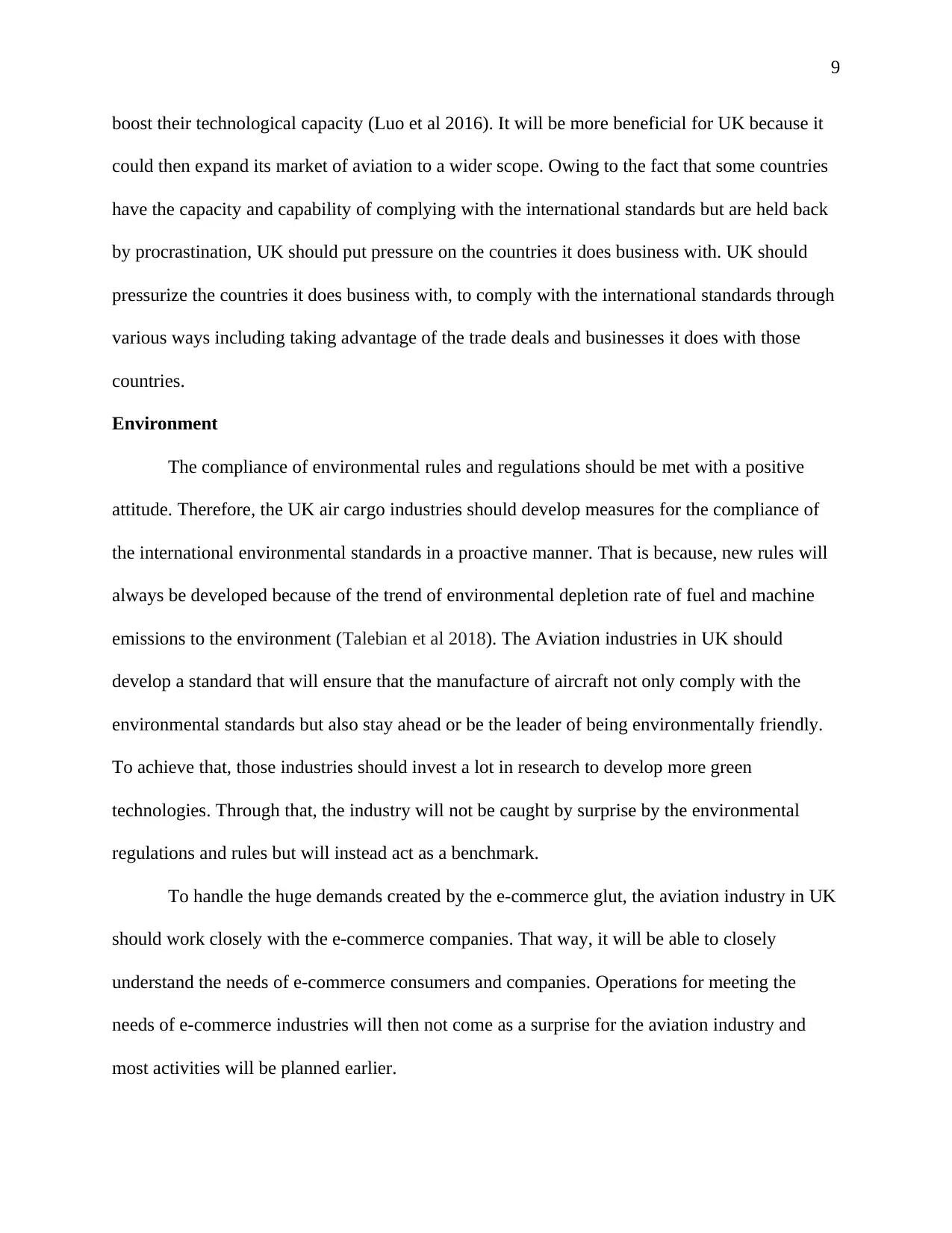
9
boost their technological capacity (Luo et al 2016). It will be more beneficial for UK because it
could then expand its market of aviation to a wider scope. Owing to the fact that some countries
have the capacity and capability of complying with the international standards but are held back
by procrastination, UK should put pressure on the countries it does business with. UK should
pressurize the countries it does business with, to comply with the international standards through
various ways including taking advantage of the trade deals and businesses it does with those
countries.
Environment
The compliance of environmental rules and regulations should be met with a positive
attitude. Therefore, the UK air cargo industries should develop measures for the compliance of
the international environmental standards in a proactive manner. That is because, new rules will
always be developed because of the trend of environmental depletion rate of fuel and machine
emissions to the environment (Talebian et al 2018). The Aviation industries in UK should
develop a standard that will ensure that the manufacture of aircraft not only comply with the
environmental standards but also stay ahead or be the leader of being environmentally friendly.
To achieve that, those industries should invest a lot in research to develop more green
technologies. Through that, the industry will not be caught by surprise by the environmental
regulations and rules but will instead act as a benchmark.
To handle the huge demands created by the e-commerce glut, the aviation industry in UK
should work closely with the e-commerce companies. That way, it will be able to closely
understand the needs of e-commerce consumers and companies. Operations for meeting the
needs of e-commerce industries will then not come as a surprise for the aviation industry and
most activities will be planned earlier.
boost their technological capacity (Luo et al 2016). It will be more beneficial for UK because it
could then expand its market of aviation to a wider scope. Owing to the fact that some countries
have the capacity and capability of complying with the international standards but are held back
by procrastination, UK should put pressure on the countries it does business with. UK should
pressurize the countries it does business with, to comply with the international standards through
various ways including taking advantage of the trade deals and businesses it does with those
countries.
Environment
The compliance of environmental rules and regulations should be met with a positive
attitude. Therefore, the UK air cargo industries should develop measures for the compliance of
the international environmental standards in a proactive manner. That is because, new rules will
always be developed because of the trend of environmental depletion rate of fuel and machine
emissions to the environment (Talebian et al 2018). The Aviation industries in UK should
develop a standard that will ensure that the manufacture of aircraft not only comply with the
environmental standards but also stay ahead or be the leader of being environmentally friendly.
To achieve that, those industries should invest a lot in research to develop more green
technologies. Through that, the industry will not be caught by surprise by the environmental
regulations and rules but will instead act as a benchmark.
To handle the huge demands created by the e-commerce glut, the aviation industry in UK
should work closely with the e-commerce companies. That way, it will be able to closely
understand the needs of e-commerce consumers and companies. Operations for meeting the
needs of e-commerce industries will then not come as a surprise for the aviation industry and
most activities will be planned earlier.
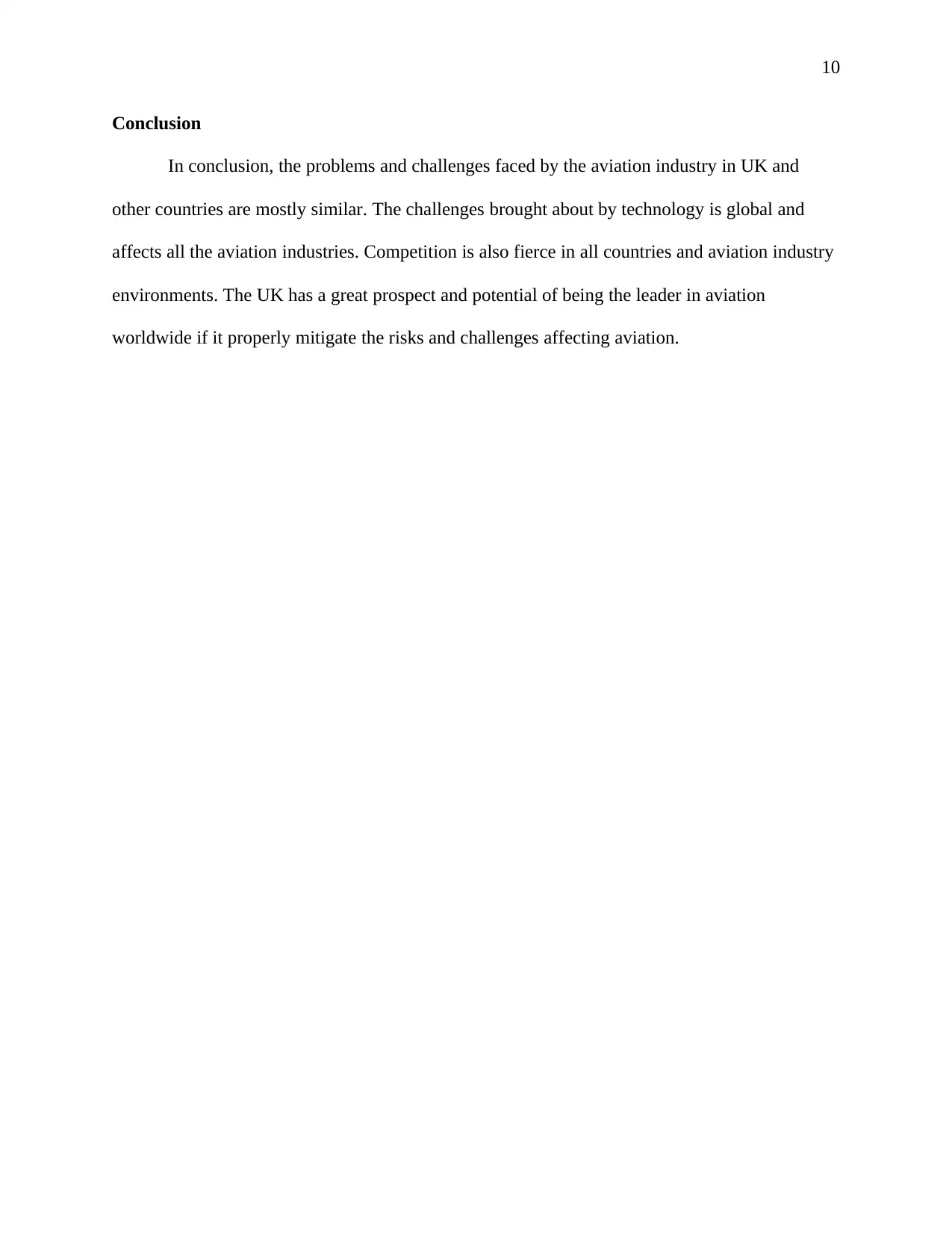
10
Conclusion
In conclusion, the problems and challenges faced by the aviation industry in UK and
other countries are mostly similar. The challenges brought about by technology is global and
affects all the aviation industries. Competition is also fierce in all countries and aviation industry
environments. The UK has a great prospect and potential of being the leader in aviation
worldwide if it properly mitigate the risks and challenges affecting aviation.
Conclusion
In conclusion, the problems and challenges faced by the aviation industry in UK and
other countries are mostly similar. The challenges brought about by technology is global and
affects all the aviation industries. Competition is also fierce in all countries and aviation industry
environments. The UK has a great prospect and potential of being the leader in aviation
worldwide if it properly mitigate the risks and challenges affecting aviation.
Secure Best Marks with AI Grader
Need help grading? Try our AI Grader for instant feedback on your assignments.
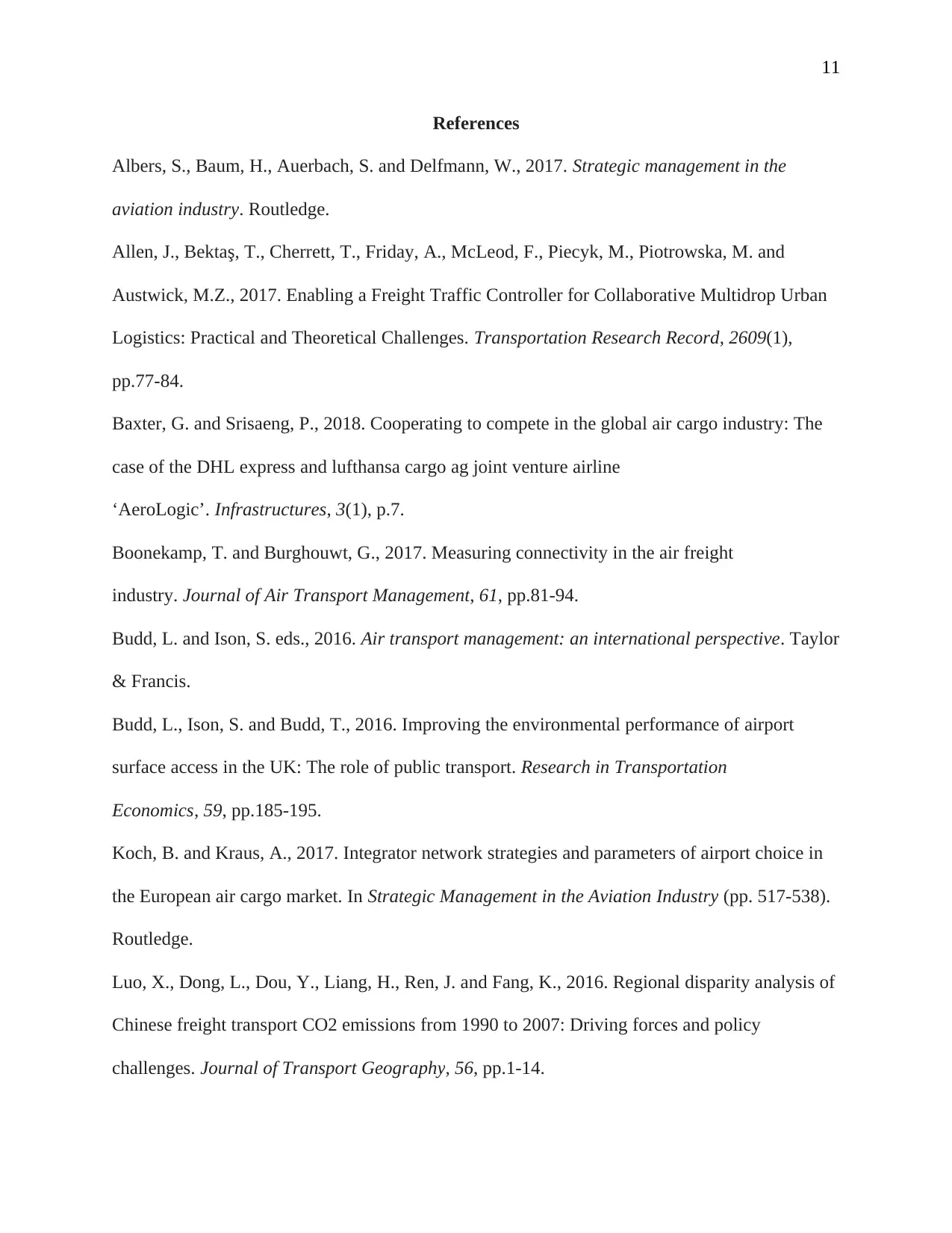
11
References
Albers, S., Baum, H., Auerbach, S. and Delfmann, W., 2017. Strategic management in the
aviation industry. Routledge.
Allen, J., Bektaş, T., Cherrett, T., Friday, A., McLeod, F., Piecyk, M., Piotrowska, M. and
Austwick, M.Z., 2017. Enabling a Freight Traffic Controller for Collaborative Multidrop Urban
Logistics: Practical and Theoretical Challenges. Transportation Research Record, 2609(1),
pp.77-84.
Baxter, G. and Srisaeng, P., 2018. Cooperating to compete in the global air cargo industry: The
case of the DHL express and lufthansa cargo ag joint venture airline
‘AeroLogic’. Infrastructures, 3(1), p.7.
Boonekamp, T. and Burghouwt, G., 2017. Measuring connectivity in the air freight
industry. Journal of Air Transport Management, 61, pp.81-94.
Budd, L. and Ison, S. eds., 2016. Air transport management: an international perspective. Taylor
& Francis.
Budd, L., Ison, S. and Budd, T., 2016. Improving the environmental performance of airport
surface access in the UK: The role of public transport. Research in Transportation
Economics, 59, pp.185-195.
Koch, B. and Kraus, A., 2017. Integrator network strategies and parameters of airport choice in
the European air cargo market. In Strategic Management in the Aviation Industry (pp. 517-538).
Routledge.
Luo, X., Dong, L., Dou, Y., Liang, H., Ren, J. and Fang, K., 2016. Regional disparity analysis of
Chinese freight transport CO2 emissions from 1990 to 2007: Driving forces and policy
challenges. Journal of Transport Geography, 56, pp.1-14.
References
Albers, S., Baum, H., Auerbach, S. and Delfmann, W., 2017. Strategic management in the
aviation industry. Routledge.
Allen, J., Bektaş, T., Cherrett, T., Friday, A., McLeod, F., Piecyk, M., Piotrowska, M. and
Austwick, M.Z., 2017. Enabling a Freight Traffic Controller for Collaborative Multidrop Urban
Logistics: Practical and Theoretical Challenges. Transportation Research Record, 2609(1),
pp.77-84.
Baxter, G. and Srisaeng, P., 2018. Cooperating to compete in the global air cargo industry: The
case of the DHL express and lufthansa cargo ag joint venture airline
‘AeroLogic’. Infrastructures, 3(1), p.7.
Boonekamp, T. and Burghouwt, G., 2017. Measuring connectivity in the air freight
industry. Journal of Air Transport Management, 61, pp.81-94.
Budd, L. and Ison, S. eds., 2016. Air transport management: an international perspective. Taylor
& Francis.
Budd, L., Ison, S. and Budd, T., 2016. Improving the environmental performance of airport
surface access in the UK: The role of public transport. Research in Transportation
Economics, 59, pp.185-195.
Koch, B. and Kraus, A., 2017. Integrator network strategies and parameters of airport choice in
the European air cargo market. In Strategic Management in the Aviation Industry (pp. 517-538).
Routledge.
Luo, X., Dong, L., Dou, Y., Liang, H., Ren, J. and Fang, K., 2016. Regional disparity analysis of
Chinese freight transport CO2 emissions from 1990 to 2007: Driving forces and policy
challenges. Journal of Transport Geography, 56, pp.1-14.
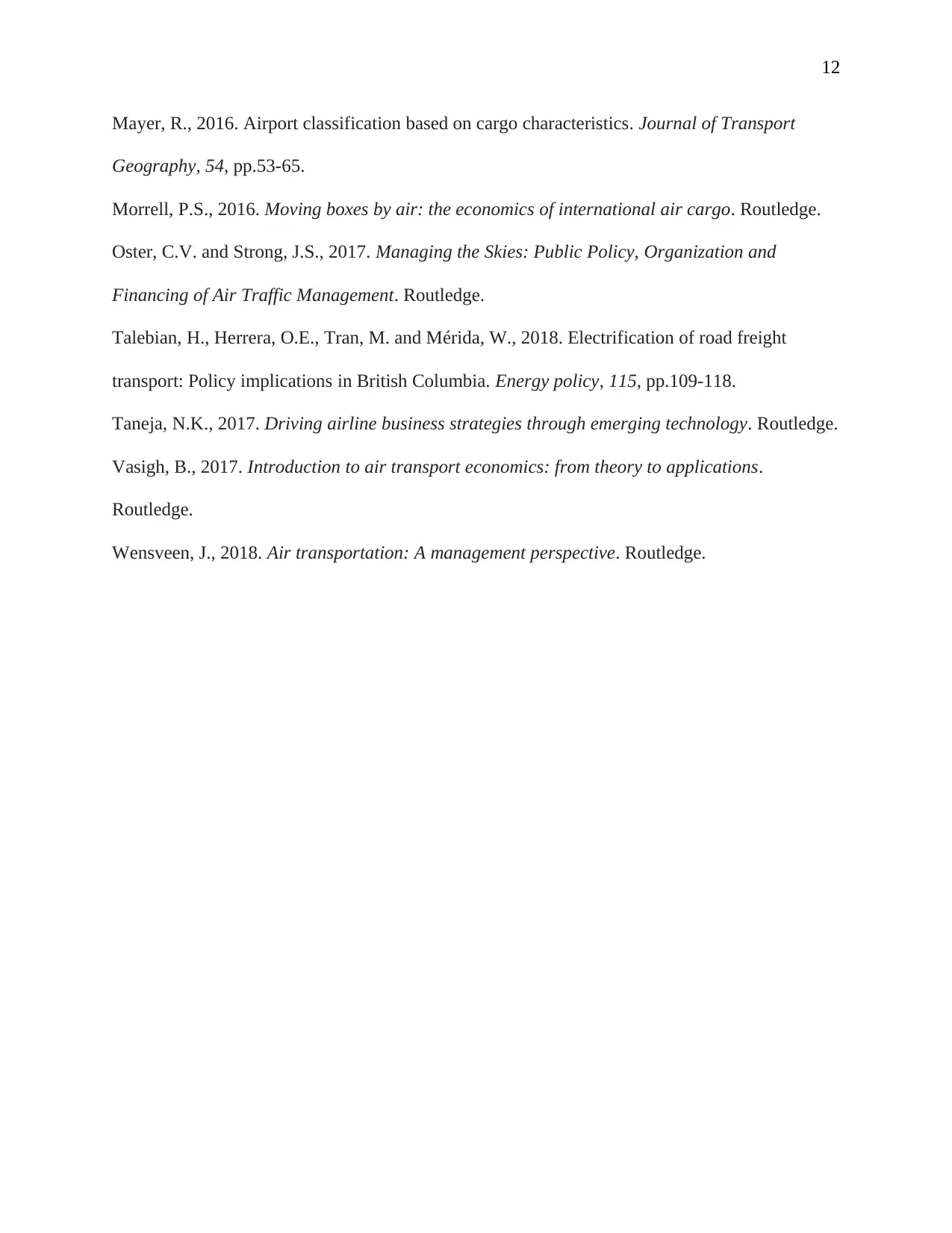
12
Mayer, R., 2016. Airport classification based on cargo characteristics. Journal of Transport
Geography, 54, pp.53-65.
Morrell, P.S., 2016. Moving boxes by air: the economics of international air cargo. Routledge.
Oster, C.V. and Strong, J.S., 2017. Managing the Skies: Public Policy, Organization and
Financing of Air Traffic Management. Routledge.
Talebian, H., Herrera, O.E., Tran, M. and Mérida, W., 2018. Electrification of road freight
transport: Policy implications in British Columbia. Energy policy, 115, pp.109-118.
Taneja, N.K., 2017. Driving airline business strategies through emerging technology. Routledge.
Vasigh, B., 2017. Introduction to air transport economics: from theory to applications.
Routledge.
Wensveen, J., 2018. Air transportation: A management perspective. Routledge.
Mayer, R., 2016. Airport classification based on cargo characteristics. Journal of Transport
Geography, 54, pp.53-65.
Morrell, P.S., 2016. Moving boxes by air: the economics of international air cargo. Routledge.
Oster, C.V. and Strong, J.S., 2017. Managing the Skies: Public Policy, Organization and
Financing of Air Traffic Management. Routledge.
Talebian, H., Herrera, O.E., Tran, M. and Mérida, W., 2018. Electrification of road freight
transport: Policy implications in British Columbia. Energy policy, 115, pp.109-118.
Taneja, N.K., 2017. Driving airline business strategies through emerging technology. Routledge.
Vasigh, B., 2017. Introduction to air transport economics: from theory to applications.
Routledge.
Wensveen, J., 2018. Air transportation: A management perspective. Routledge.
1 out of 12
Related Documents
Your All-in-One AI-Powered Toolkit for Academic Success.
+13062052269
info@desklib.com
Available 24*7 on WhatsApp / Email
![[object Object]](/_next/static/media/star-bottom.7253800d.svg)
Unlock your academic potential
© 2024 | Zucol Services PVT LTD | All rights reserved.





